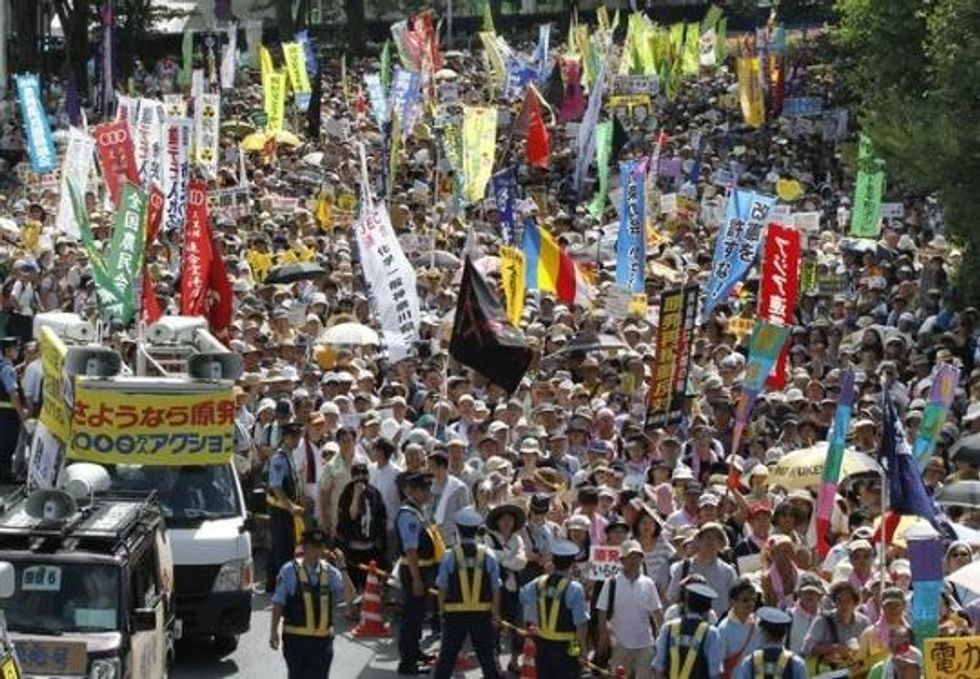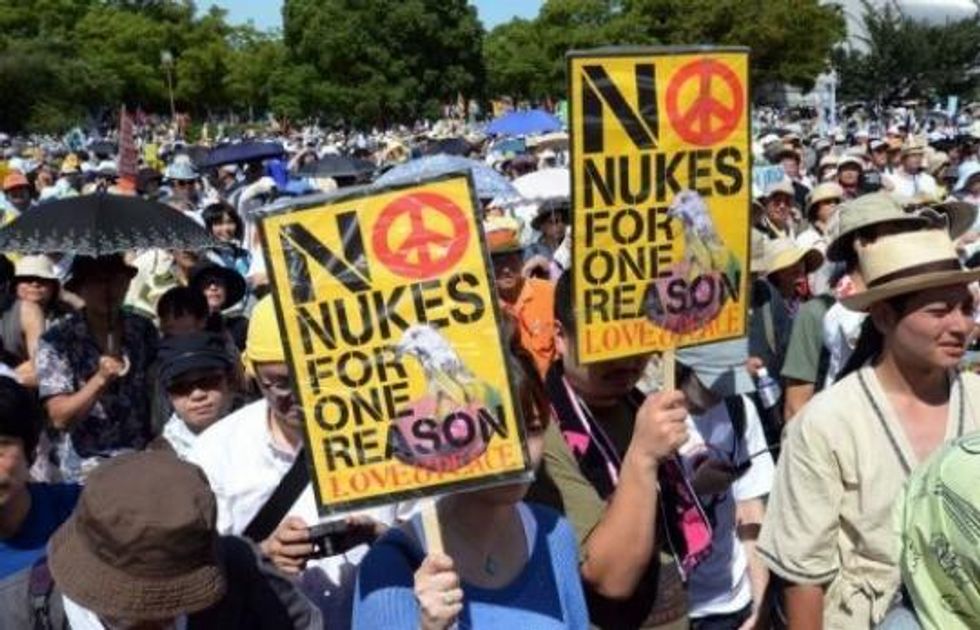Jul 16, 2012

Over 100,000 protesters took to the streets in central Tokyo on Monday to protest the country's return to nuclear power. The demonstration was one of the largest of its kind since Prime Minister Yoshihiko Noda announced that the country would restart its nuclear reactors last month.
Protest organizers estimated the crowd at 170,000 people. Demonstrators marched through the streets in Tokyo's record setting heat chanting: "Don't resume nuclear power operation. Prime Minister (Yoshihiko) Noda should quit."
"We are so angry because no progress has been made in terms of compensation and decontamination," said Noboru Shikatani, a 71-year-old man who evacuated Fukushima after the disaster.
Public anger over the handling of last year's Fukushima disaster has continued to swell. Earlier this month a damning report released by a parliamentary panel investigating the government's handling of the disaster found that plant owner TEPCO and government regulators intentionally ignored key warnings and preparations that should have been implemented before the tsunami. The subsequent nuclear disaster to follow was "clearly man-made," according to the panel.
"We can't accept any resumption of nuclear power operation as the Fukushima case has not been resolved at all," Shikatani added. "We want to bring our voice to many people by joining this kind of demonstration."
The last of the country's nuclear reactors had been shut down in May, following public pressure; however, the first reactor at the Oi plant in Fukui prefecture was restarted July 1, 2012 despite widespread criticism.
Noda now plans to eventually restart all 50 of Japan's reactors, a campaign that has seen large scale protests since its announcement.

Why Your Ongoing Support Is Essential
Donald Trump’s attacks on democracy, justice, and a free press are escalating — putting everything we stand for at risk. We believe a better world is possible, but we can’t get there without your support. Common Dreams stands apart. We answer only to you — our readers, activists, and changemakers — not to billionaires or corporations. Our independence allows us to cover the vital stories that others won’t, spotlighting movements for peace, equality, and human rights. Right now, our work faces unprecedented challenges. Misinformation is spreading, journalists are under attack, and financial pressures are mounting. As a reader-supported, nonprofit newsroom, your support is crucial to keep this journalism alive. Whatever you can give — $10, $25, or $100 — helps us stay strong and responsive when the world needs us most. Together, we’ll continue to build the independent, courageous journalism our movement relies on. Thank you for being part of this community. |
Our work is licensed under Creative Commons (CC BY-NC-ND 3.0). Feel free to republish and share widely.

Over 100,000 protesters took to the streets in central Tokyo on Monday to protest the country's return to nuclear power. The demonstration was one of the largest of its kind since Prime Minister Yoshihiko Noda announced that the country would restart its nuclear reactors last month.
Protest organizers estimated the crowd at 170,000 people. Demonstrators marched through the streets in Tokyo's record setting heat chanting: "Don't resume nuclear power operation. Prime Minister (Yoshihiko) Noda should quit."
"We are so angry because no progress has been made in terms of compensation and decontamination," said Noboru Shikatani, a 71-year-old man who evacuated Fukushima after the disaster.
Public anger over the handling of last year's Fukushima disaster has continued to swell. Earlier this month a damning report released by a parliamentary panel investigating the government's handling of the disaster found that plant owner TEPCO and government regulators intentionally ignored key warnings and preparations that should have been implemented before the tsunami. The subsequent nuclear disaster to follow was "clearly man-made," according to the panel.
"We can't accept any resumption of nuclear power operation as the Fukushima case has not been resolved at all," Shikatani added. "We want to bring our voice to many people by joining this kind of demonstration."
The last of the country's nuclear reactors had been shut down in May, following public pressure; however, the first reactor at the Oi plant in Fukui prefecture was restarted July 1, 2012 despite widespread criticism.
Noda now plans to eventually restart all 50 of Japan's reactors, a campaign that has seen large scale protests since its announcement.


Over 100,000 protesters took to the streets in central Tokyo on Monday to protest the country's return to nuclear power. The demonstration was one of the largest of its kind since Prime Minister Yoshihiko Noda announced that the country would restart its nuclear reactors last month.
Protest organizers estimated the crowd at 170,000 people. Demonstrators marched through the streets in Tokyo's record setting heat chanting: "Don't resume nuclear power operation. Prime Minister (Yoshihiko) Noda should quit."
"We are so angry because no progress has been made in terms of compensation and decontamination," said Noboru Shikatani, a 71-year-old man who evacuated Fukushima after the disaster.
Public anger over the handling of last year's Fukushima disaster has continued to swell. Earlier this month a damning report released by a parliamentary panel investigating the government's handling of the disaster found that plant owner TEPCO and government regulators intentionally ignored key warnings and preparations that should have been implemented before the tsunami. The subsequent nuclear disaster to follow was "clearly man-made," according to the panel.
"We can't accept any resumption of nuclear power operation as the Fukushima case has not been resolved at all," Shikatani added. "We want to bring our voice to many people by joining this kind of demonstration."
The last of the country's nuclear reactors had been shut down in May, following public pressure; however, the first reactor at the Oi plant in Fukui prefecture was restarted July 1, 2012 despite widespread criticism.
Noda now plans to eventually restart all 50 of Japan's reactors, a campaign that has seen large scale protests since its announcement.

We've had enough. The 1% own and operate the corporate media. They are doing everything they can to defend the status quo, squash dissent and protect the wealthy and the powerful. The Common Dreams media model is different. We cover the news that matters to the 99%. Our mission? To inform. To inspire. To ignite change for the common good. How? Nonprofit. Independent. Reader-supported. Free to read. Free to republish. Free to share. With no advertising. No paywalls. No selling of your data. Thousands of small donations fund our newsroom and allow us to continue publishing. Can you chip in? We can't do it without you. Thank you.